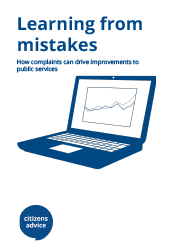Learning from mistakes - how complaints can drive improvements to public services
 In Learning from mistakes [ 1.5 mb] we explore what happens when people experience poor service from public service providers in areas ranging from health and education to taxation and social care. Citizens Advice has seen a 63 per cent increase in requests for help to complain about public services over the last four years.
In Learning from mistakes [ 1.5 mb] we explore what happens when people experience poor service from public service providers in areas ranging from health and education to taxation and social care. Citizens Advice has seen a 63 per cent increase in requests for help to complain about public services over the last four years.
We decided to explore why people are struggling to complain, or deterred from complaining, and how reversing these trends and making better use of complaints data could drive service improvements and help identify early signs of service failure.
We commissioned a nationally representative survey, asking people about their recent experiences with public service providers, and interviewed Citizens Advice clients who have gone through formal public service complaints processes.
We also looked at less formal complaints channels, using natural language processing (NLP) and machine learning techniques to analyse how people use social media to express their frustration after poor service, and what insights this new complaints channel might offer for service improvements. We found that:
-
People don’t make formal complaints after poor public service. 45 per cent of people have experienced poor public service recently, but only 22 per cent of them went on to make a formal complaint. However, 73 per cent used informal channels to share their frustrations, with one in five younger people turning to social media, for instance.
-
The feedback and insight of specific groups is being missed. 52 per cent of people said they didn’t complain about a poor experience with a public service because they felt ‘it wouldn’t change anything’. Younger and older people, and those on lower incomes, tend to find it hardest to make formal complaints.
-
Aggregating complaints data, including from informal channels such as social media, can provide important insight into potential service improvements. These insights - for example on call waiting times to HMRC - can be gained and acted on in real time.
Mistakes happen, but we are wasting opportunities to improve public services if people are put off complaining and if the value of complaints data is not realised. Through our research, we identify a range of opportunities for reforming the existing approach of public service providers to handling complaints and using complaints data, and we will be sharing our findings with relevant organisations.

